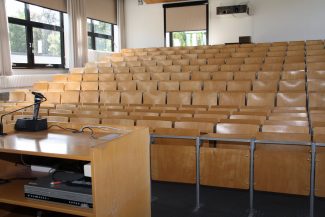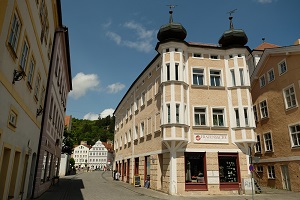7th – 10th February 2024 Eichstätt, Germany
Please find our Call for Papers here. If you would like to attend the conference in person, please get in touch with us via gk-practicingplace@ku.de. We will publish more information about remote access in the upcoming weeks.
Main Venue (Feb. 8-10)
Bischöfliches Seminar
St. Willibald, Eichstätt KdöR
Leonrodplatz 3
85072 Eichstätt
|
Venue Pre-Conference Programme
Kapuzinerkloster (KAP), room 209
Kapuzinergasse 2
85072 Eichstätt
|
Wednesday, 7 February 2024: Pre-conference Programme (KAP 209)
17.00 Informal Get-Together / Registration
18.00 Film Screening Sollbruchstelle/Devil Hides in Doubt with Director Eva Stotz
20.00 Pre-Conference Dinner
Ristorante Tartufo
Marktplatz 22, 85072 Eichstätt
Thursday, 8 February 2024: Conference Day 1 (Bischöfliches Seminar)
8.30 Welcome Coffee and Opening Remarks
9.00 Keynote 1: Helen Hester (London School of Film, Media and Design)
“Situating Knowledge, Emplacing Imagination”
Chair: Sarah Earnshaw
10.30 Practitioners Panel 1: Eva Stotz
“Life as raw material”
Chair: Shruti Malik
12.00 Lunch and Poster Session
14.00 Panel 1: Political Imaginations
Chair: Moritz Wischert-Zielke
Norma Musih (The Hebrew University of Jerusalem)
“On Three Practices for Training a Political Imagination in Palestine-Israel”
Ece Canlı (University of Minho)
“Dreams Unwalled: Prison Abolitionism as a Radical Practice of Collective Reimagination”
Philipp Sperner (University of Munich)
“Window of Opportunity: Vinod Kumar Shukla and the Social Imaginary as a Practice of Spatialization”
Nicole Schneider (University of Munich)
“Re-Imagining the Location of Publics”
16.00 Coffee Break
16.15 Panel 2: Precarity and Power
Chair: Fabian Ebeling
Niklas Pernhaupt (University of Vienna)
“A community imagines – Exploring the imagination of a better work environment among Austrian junior researchers”
Khushboo Jain (FAU Erlangen)
“Reimagining Home”
Sarah Earnshaw (University of Eichstätt)
“Drawing the (Picket) Line – Placing Cultural (Workers) Protest Imaginaries”
Christiane Hoth de Olano (University of Eichstätt)
“Frontier Images: Practices of Knowledge Production on Native Medicinal Plants and the Believe in Miraculous Remedies”
20.00 Conference Dinner
Zum Gutmann, Wirtshaus & Kleinkunst
Am Graben 36, 85072 Eichstätt
Friday, 9 February 2024: Conference Day 2 (Bischöfliches Seminar)
9.30 Welcome Coffee
10.00 Panel 3: Fiction and Its Imaginations
Chair: Gustavo Adolfo Gutierrez Hernandez
Oluwole Coker (Obafemi Awolowo University)
“Towards the Reimagination of Futures in Nigeria Diaspora Science Fiction”
Anja Heron Lind (TU Dresden)
“Irigaray and SF: Spatialising Sexual Difference in the Teixcalaan Duology”
Can Aydın (TU Dresden)
“‘Being Found’ in Cyberwilderness in Jonny Appleseed”
Johanna Lederer (University of Eichstätt)
“Imagining Places through Indigenous Futurist Comics: Chelsea Vowel’s ‘kitaskînaw 2350’”
12.00 Lunch
14.00 Practitioners Panel 2: Frog Design Studio
“Love 2075: Building archetypes of romantic love using speculative design framework”
Chair: Shruti Malik
15.30 Coffee Break
15.45 Panel 4: Urban Studies and Architecture
Chair: Jessica Balling
Iuliana Gavril (Norwich University of the Arts)
“Tracing Out the Ireal Real Estate: From Real Objects to Dream Houses”
Seyedeh Zhaleh Abbasi Hosseini (University of Brussels)
“Echoes of Tehran: Navigating Urban Imaginaries in Azar Nafisi’s Reading Lolita in Tehran: A Memoir in Books”
Elisabeth Sommerlad (Johannes Gutenberg-University Mainz)
“Reimagine Nature for the Future: Practices of (Re-)Imagining and (Re-)Placing Nature in Dubai and Mauritius”
17.15 Coffee Break
17.30 Keynote 2: Hannes Krämer (University of Duisburg-Essen)
“The Borders of Tomorrow. Imagining the Futures of Europe’s Margins”
Chair: David Kempf
20.00 Conference Dinner
Gasthof Krone
Domplatz 3, 85072 Eichstätt
Saturday, 10 February 2024: Conference Day 3 (Bischöfliches Seminar)
9.00 Welcome Coffee
9.30 Panel 5: Exercises in Imagining
Chair: Sabine Aretz
Nathalia Lavigne (University of São Paulo)
“An imaginary in metamorphosis: From André Mauraux’s Museum Without Walls to a collaborative understanding about museums in the digital sphere”
Sofia Pedrini (Ruhr University Bochum)
“On the cultural constraints of thought experiments”
David Kempf (University of Eichstätt)
“Placing the Translation from Implicit to Explicit: Arenas, Psychoanalysis and Ocean Voyages”
11.00 Closing Remarks and Wrap Up


